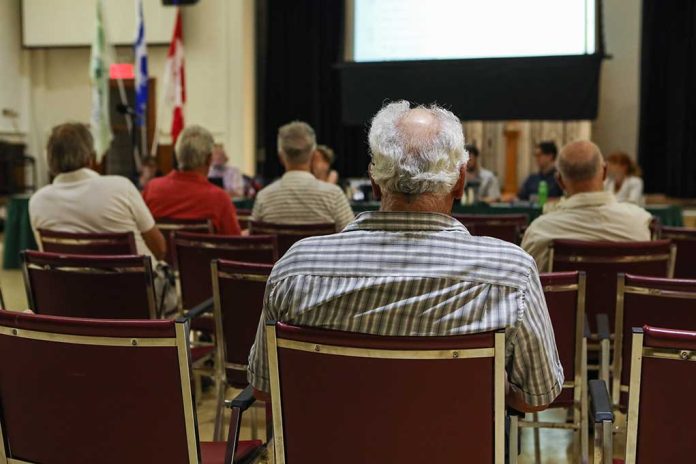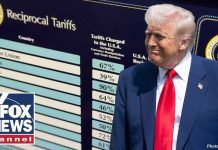
Republican lawmakers face coordinated disruptions at town halls as leftist groups attempt to hijack meetings across conservative states, revealing a clash of political values that’s testing the traditional format of constituent engagement.
Key Takeaways
- Rep. Harriet Hageman of Wyoming and Rep. Mike Flood of Nebraska faced organized disruptions at recent town halls, with protesters booing discussions of federal efficiency measures.
- Progressive groups like MoveOn and Indivisible have been coordinating protests at Republican town halls, organizing events titled “Musk or Us” and encouraging attendance through social media.
- Many House Republicans have switched to tele-town halls for safety and control, while left-wing organizations exploit this by staging “empty chair” events to create narratives about absent lawmakers.
- Despite the disruptions, Wyoming’s political landscape remains firmly conservative, as evidenced by Hageman’s decisive victory over Liz Cheney in the primary.
- Concerns about Social Security cuts and billionaire influence dominated the contentious exchanges at these Republican town halls.
Wyoming Representative Faces Hostile Crowd
Representative Harriet Hageman confronted a contentious atmosphere during her recent town hall in Albany County, Wyoming. The meeting quickly devolved when attendees booed her comments about federal government cuts and her observation about their apparent fixation on government affairs. The hostile reception intensified when Hageman addressed the Department of Government Efficiency (DOGE) initiative, with protesters interrupting her explanations and chanting “deport Elon” in reference to Elon Musk’s involvement in government efficiency efforts.
The tension escalated to the point where Hageman cut the session short by 15 minutes, citing the persistent interruptions. Her adviser later claimed the disruptions were pre-planned and organized by partisan operatives. When attendees expressed concerns about potential cuts to Social Security, Hageman attempted to clarify the situation but was frequently drowned out by the crowd’s reactions.
Organized Protests Target GOP Events
The disruptions at Hageman’s event appear to be part of a broader pattern affecting Republican lawmakers across the country. In Nebraska, Representative Mike Flood’s town hall event experienced similar disruptions. Progressive organizations including MoveOn and Indivisible had organized a protest titled “Musk or Us: Demand Mike Flood Fight Back!” specifically targeting his event. Social media platforms, including Reddit, featured discussions encouraging people to attend and protest against Flood’s positions.
“It’s so bizarre to me how obsessed you are with federal government,” Rep. Harriet Hageman told the crowd at her Wyoming town hall, sparking immediate boos and jeers from attendees. Hageman attempted to explain to the crowd amidst interruptions, saying “DOGE is not dismantling Social Security, and even with reconciliation, we are not allowed to touch Social Security.”
The disruptions have grown so persistent that many Republican leaders now discourage in-person town halls entirely. Most House Republicans have shifted to telephone town halls, which allow for greater control over who speaks and what questions are addressed. This tactical retreat from face-to-face forums has created an opening that Democratic strategists are exploiting, with left-wing groups organizing mock events featuring empty chairs to represent “absent” GOP lawmakers.
Constituent Concerns vs. Partisan Tactics
While some demonstrators at these events raised legitimate policy concerns about Social Security protection and government spending priorities, questions have emerged about the authenticity of the protests. Local Wyoming residents denied being paid to disrupt Hageman’s event, despite claims of astroturfing. The Albany County Democratic Party organized a demonstration outside the venue but emphasized that they encouraged respectful dialogue during the town hall itself.
In Nebraska, Representative Flood maintained his conservative policy stance despite vocal opposition. When discussing budget issues, one attendee passionately objected: “So are we going to sit on the couch and let these billionaires control the country? Hell no. We are the poor people. We’re a red state.” The exchange highlighted the dramatic political theater playing out at these events, where policy discussions often become secondary to emotional confrontations.
Wyoming’s Conservative Reality Remains Strong
Despite the heated scenes at these town halls, political analysts point out that the disruptions may have limited impact on Wyoming’s political landscape. The state’s deeply conservative electorate delivered Harriet Hageman a decisive victory over Liz Cheney in the primary, suggesting that the organized protests may not reflect genuine shifts in voter sentiment. Wyoming remains one of the nation’s most reliably conservative states, where progressive demonstrations have historically gained little traction.
As Republican lawmakers navigate this challenging environment, many continue to seek effective ways to engage with constituents while managing the disruptions. The conflict highlights the growing polarization in American politics, where town halls—once a staple of representative democracy—have increasingly become venues for partisan theater rather than substantive policy discussions.
Sources:
- https://www.nbcnews.com/politics/congress/republican-lawmaker-booed-rowdy-town-hall-complaining-crowd-obsessed-g-rcna197278
- https://www.pbs.org/newshour/show/inside-a-heated-town-hall-where-a-nebraska-republican-faced-backlash-over-trumps-policies
- https://www.foxnews.com/politics/chaos-erupts-gop-lawmakers-town-hall-after-left-wing-groups-promote-protests
- https://townhall.com/tipsheet/mattvespa/2025/03/21/wyoming-hageman-astroturf-n2654124



